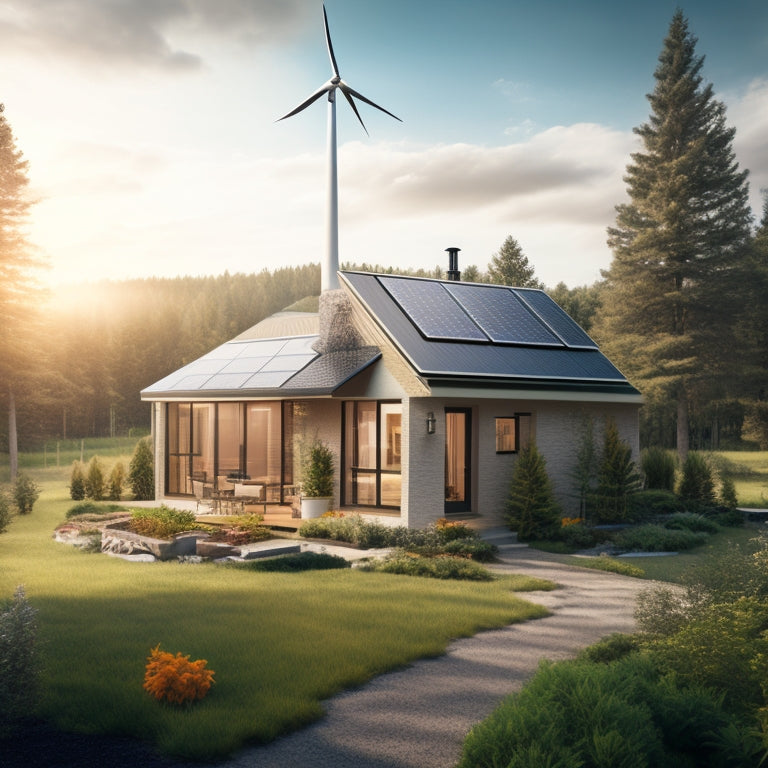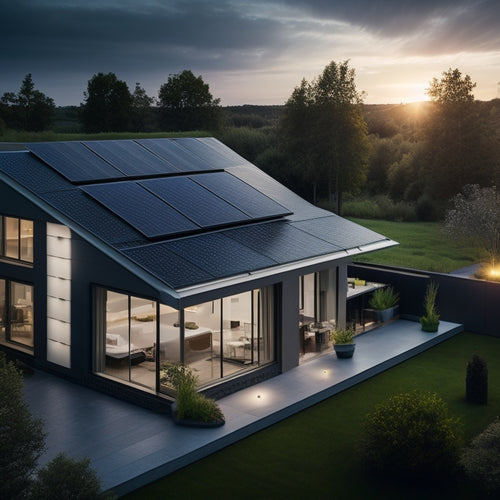
What Heats Homes With Renewable Energy?
Share
You're exploring ways to heat your home with renewable energy, and there are several innovative solutions available. Solar thermal systems, heat pump technology, radiant floor heating, solar water heaters, and passive solar design are all viable options. These eco-friendly solutions can greatly reduce your reliance on fossil fuels and lower your energy bills. From capturing sunlight to utilizing geothermal energy, these technologies can provide a sustainable and comfortable heating solution for your home. As you consider making the switch, you'll uncover the unique advantages and benefits of each option, and how they can work together to create a harmonious and environmentally friendly living space.
Overview
- Solar thermal systems provide warmth and hot water by harnessing the sun's energy, reducing reliance on fossil fuels and energy bills.
- Heat pumps offer efficient heating and cooling, storing excess energy and reducing carbon footprint when paired with renewable sources.
- Radiant floor heating, powered by renewable energy, provides cozy warmth with minimal environmental impact, ideal for small areas or entire homes.
- Solar water heaters utilize sunlight to supply up to 80% of hot water needs, decreasing energy bills and reliance on traditional energy.
- Passive solar design maximizes natural ventilation and thermal mass materials to regulate home temperature, enhancing energy efficiency and reducing fossil fuel use.
Solar Thermal Systems Explained
Solar thermal systems employ the sun's energy to provide warmth and hot water for your home. These systems consist of solar panels, a heat exchanger, and a storage tank. You can install them on your roof or in your yard, depending on the space available.
Solar thermal systems are highly energy-efficient, converting up to 80% of the sun's energy into usable heat. By choosing the right solar panels for your system, such as high-efficiency panels that yield more energy per hour of sunlight off-grid solar power systems, you can maximize your energy output.
This means you'll reduce your reliance on fossil fuels and lower your energy bills. With a solar thermal system, you'll enjoy a consistent supply of hot water and warmth, even on cloudy days, thanks to the stored energy.
Heat Pump Technology Advantages
Frequently, homeowners seeking to reduce their reliance on fossil fuels turn to heat pump technology for an efficient and environmentally friendly solution.
You'll benefit from its ability to provide both heating and cooling, making it a versatile option for your home. Additionally, when paired with home energy storage systems deep cycle batteries, heat pumps can store excess energy generated from renewable sources for later use, increasing energy autonomy and reducing reliance on the grid.
Heat pumps can be powered by renewable energy sources like geothermal systems, which utilize the earth's natural heat. Additionally, they can be paired with biomass heating systems, which burn organic matter to produce energy.
This reduces your carbon footprint and dependence on non-renewable resources. With heat pump technology, you can enjoy a comfortable living space while contributing to a more sustainable future. Its advantages make it an attractive choice for those seeking freedom from fossil fuels.
Radiant Floor Heating Options
You're considering radiant floor heating options as a means to warm your home, and for good reason - this technology has gained popularity due to its energy efficiency and comfort benefits.
Additionally, off-grid solar power systems, such as those offered in the WindyNation Complete Kit, can provide a reliable source of renewable energy to power your heating system.
There are two primary types of radiant floor heating: electric floor and hydronic systems.
Electric floor heating involves installing heating elements, such as mats or cables, under your flooring. This option is ideal for small areas, like bathrooms or kitchens.
Hydronic systems, on the other hand, use hot water circulating through pipes to warm your space. They're more complex and often require a boiler or heat pump.
Both options can be powered by renewable energy sources, providing a sustainable and cozy heating solution.
Solar Water Heater Benefits
As you investigate renewable energy options for heating your home, consider the benefits of incorporating a solar water heater into your system.
This technology utilizes sunlight to heat water, reducing your reliance on traditional energy sources. By doing so, you'll increase your energy efficiency and enjoy significant cost savings.
Solar water heaters can provide up to 80% of your hot water needs, slashing your energy bills. Additionally, they're durable, lasting up to 20 years or more, and require minimal maintenance.
Passive Solar Design Principles
Your home's design plays an essential role in utilizing natural energy. By incorporating passive solar design principles, you can reduce your reliance on fossil fuels and enjoy a more sustainable living space.
One key principle is to maximize natural ventilation by strategically placing windows and doors to allow cool air to enter and hot air to escape. Thermal mass, such as concrete or brick, can also be used to absorb and release heat, regulating your home's temperature.
Additionally, consider the orientation of your home, with south-facing windows receiving direct sunlight during winter and shade during summer.
Frequently Asked Questions
Can I Mix and Match Different Renewable Energy Systems for My Home?
You can create a customized hybrid system by mixing and matching different renewable energy sources, optimizing energy efficiency and reducing reliance on traditional power grids, giving you more freedom and control over your home's energy needs.
How Much Does It Cost to Install a Renewable Energy System?
You'll find installation costs vary greatly depending on system types, such as solar, wind, or geothermal, and factors like system size, quality, and installation complexity, ranging from $10,000 to $50,000 or more, but you'll reap long-term energy independence benefits.
Are Renewable Energy Systems Eligible for Government Incentives?
You're likely to strike gold with government incentives, as renewable energy systems are eligible for attractive government grants, tax credits, and financing options, but be sure to meet the strict eligibility criteria to reap the benefits.
Can I Use Renewable Energy to Power My Entire Home?
You can power your entire home with renewable energy, exploring solar panel options for roof integration or ground-mounted systems, and considering wind turbine benefits, like vertical axis designs, to utilize natural resources and break free from grid dependence.
Do I Need to Replace My Existing HVAC System for Renewable Energy?
As you commence on a greener path, you're wondering if your existing HVAC system needs a makeover; the answer lies in its efficiency - a renewable retrofitting might breathe new life into it, but a replacement might be necessary for peak performance.
Ready to Buy
As you weigh your options for heating your home with renewable energy, it's likely that multiple solutions will converge to meet your needs. Coincidentally, the strengths of solar thermal systems, heat pump technology, radiant floor heating, and solar water heaters often overlap, making a hybrid approach a persuasive choice. By integrating these solutions with passive solar design principles, you'll create a harmonious system that not only reduces your carbon footprint but also optimizes energy efficiency and cost savings.
Related Posts
-

Why Outdoor Solar Lighting Systems Are Sustainable
Outdoor solar lighting systems are sustainable because they utilize renewable energy, drastically reducing your carbo...
-
Average Lifespan of Solar Battery Banks
The average lifespan of solar battery banks generally ranges from 5 to 15 years. This variation mainly stems from the...
-

Home Solar Battery
You're opting for a home solar battery that allows you to utilize the power of the sun during the day and use it at n...

